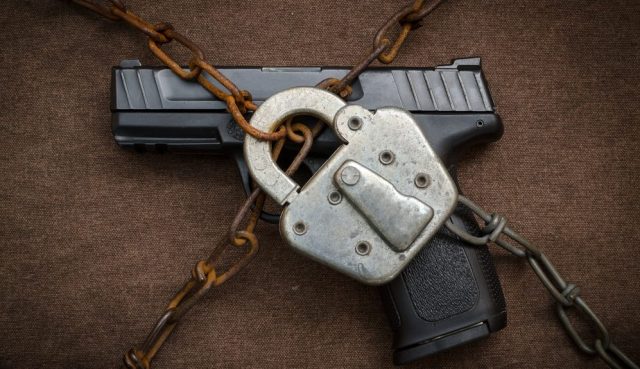 After yesterday’s horrifying shooting in Alexandria, Virginia, “the conversation” about gun control has [of course] taken center stage once again. While Republicans grapple with the difficult question of how to satisfy the NRA while still appearing sympathetic to their wounded colleagues, SCOTUS is deciding whether now is the right time to weigh in on guns. Today, the Supreme Court is scheduled to review Peruta v. California, a California case in which gun advocates are fighting for Californians’ right to carry concealed firearms in public.
After yesterday’s horrifying shooting in Alexandria, Virginia, “the conversation” about gun control has [of course] taken center stage once again. While Republicans grapple with the difficult question of how to satisfy the NRA while still appearing sympathetic to their wounded colleagues, SCOTUS is deciding whether now is the right time to weigh in on guns. Today, the Supreme Court is scheduled to review Peruta v. California, a California case in which gun advocates are fighting for Californians’ right to carry concealed firearms in public.
Before anyone starts warming up their Charlton Heston impressions, let’s get back to basics. The Second Amendment guarantees the “right to bear arms.” Like other rights guaranteed by other amendments (speech, jury trials, voting, just to name a few), the rights conferred by the Second Amendment are important, but not infinite. Just as not all speech is protected, and not all court cases require juries, not all things done in the name of self-defense are sacrosanct.
There’s no question that the making of laws relating to ownership, use, and licensing of firearms falls well within the ambit of state authority. In fact, the only real question is whether a particular state law regulates firearms so much as to run afoul of the Second Amendment’s guarantee. That pledge, by the way, isn’t and has never been that anyone can own a gun of any kind. The Heller case did interpret the Second Amendment as guaranteeing an individual the right to have a hand gun for self-defense in the home — but it’s worth noting that Heller was a 5 to 4 decision that was handed down just a few years ago. That’s not to say that Heller isn’t controlling precedent—it surely is, thanks to the late Justice Scalia; but if we’re creating accurate context for gun laws, interpreting the Second Amendment’s “right to keep and bear arms” as a green-light for handguns is a recent (and controversial) phenomenon. Reading the Second Amendment as an entitlement to own and carry weapons is more closely analogous to the right to privacy (read into, but not specifically listed in the First Amendment) than it is to freedom of speech or religion – which is in the plain language of the Constitution itself.
It is against this backdrop that the California legislature chose to restrict the carrying of concealed firearms in public. A person applying for a concealed-carry license must show, among other things, that “good cause” exists for him or her to carry a concealed firearm. Each respective county then gets the fun job of deciding what it thinks “good cause” means for its citizens.
In Peruta v. California, the plaintiffs argue that one county—San Diego—defined “good cause” so narrowly that a typical law-abiding resident couldn’t get a concealed-carry license. Their logic is essentially that any gun restriction that functions to actually restrict guns is inherently unconstitutional.
The Ninth Circuit disagreed with the plaintiffs’ position and held that the Second Amendment does not provide blanket entitlement for members of the general public to carry concealed firearms in public. If every county in California chooses to restrict concealed-carry gun permits, it is welcome to do so, the court felt. The usual suspects weighed in via amicus briefs and made the usual arguments – that the Second Amendment should be read far more broadly.
At its conference today, the Supreme Court will discuss whether it really feels like taking a position on the boundaries of the Second Amendment – something the high court has tried its best to stay away from. Peruta is hardly the first case to bring state gun restrictions up to the Supreme Court. Several cases have raised similar Constitutional challenges to state gun laws, but SCOTUS hasn’t been too keen on getting involved. Peruta itself was listed for the justices’ private conference eleven times and rescheduled four times. Now that Neil Gorsuch is on the bench, though, we may see some new gun decisions.
Does yesterday’s shooting really change anything central to the legal analysis? Certainly not. Gun violence did not suddenly become a problem because members of Congress were victimized. Perhaps the one element of good to come from the unnecessary violence on that ball-field is that our high court will hand down some certainty.
[Image via Shutterstock]